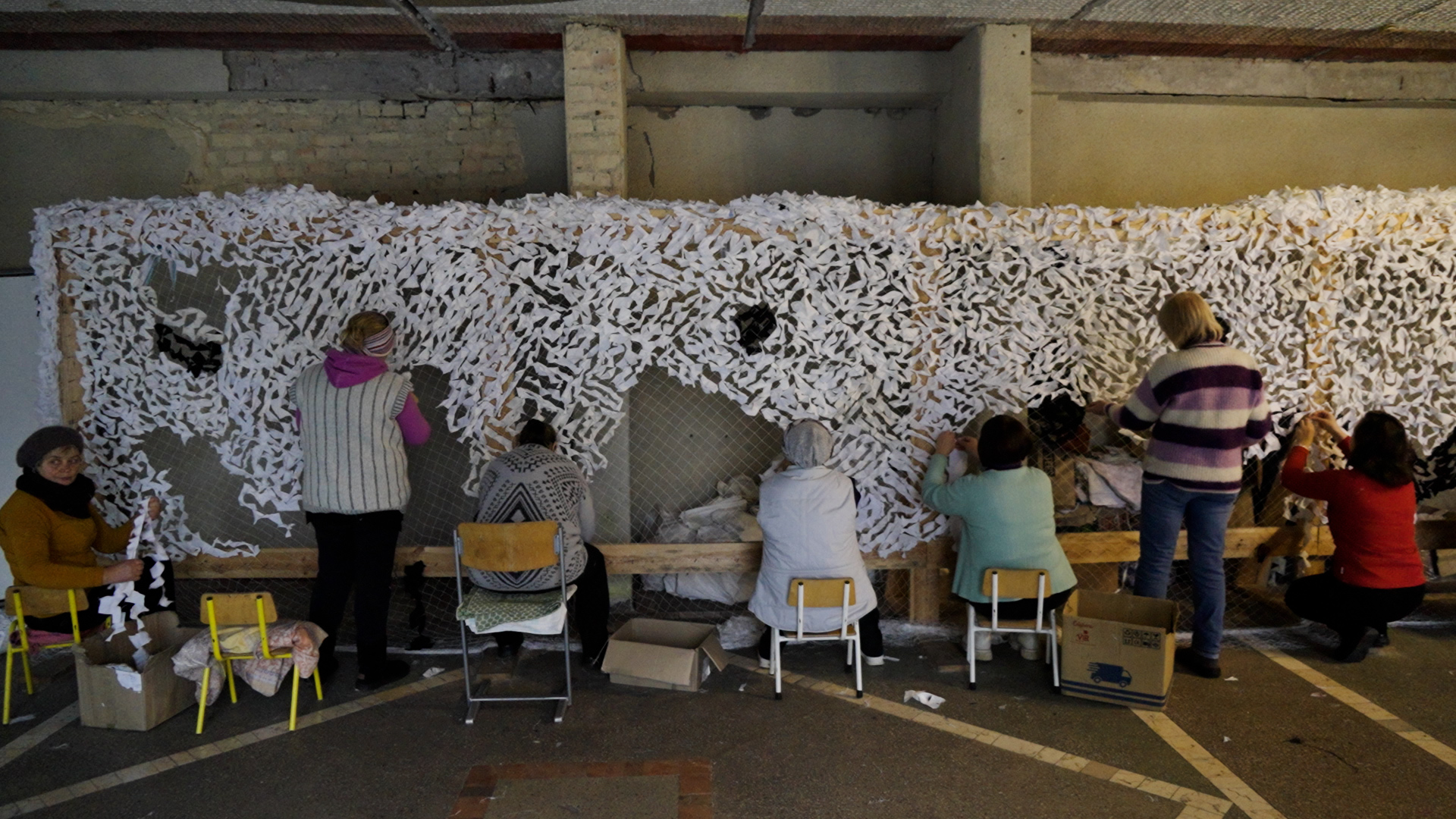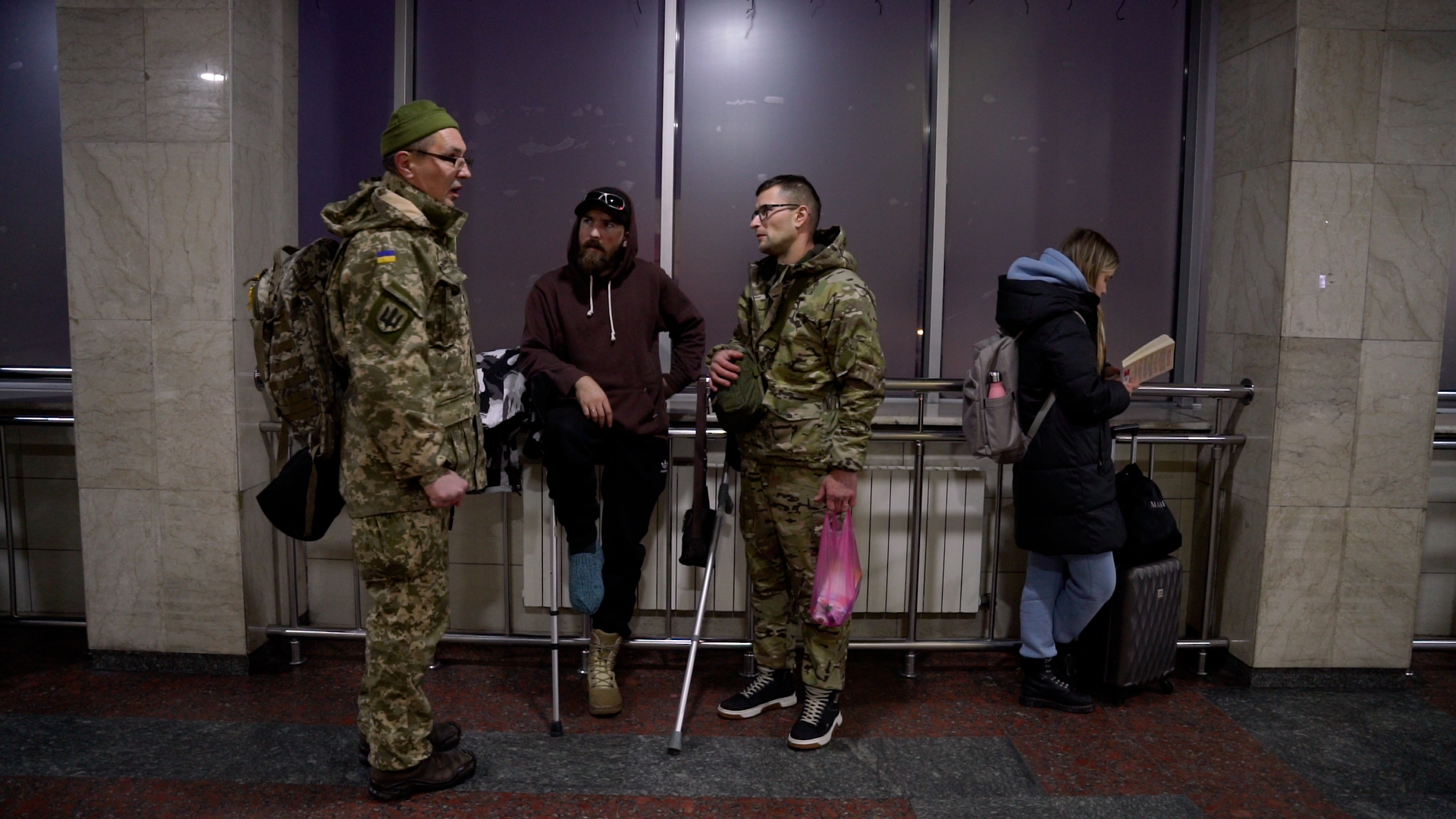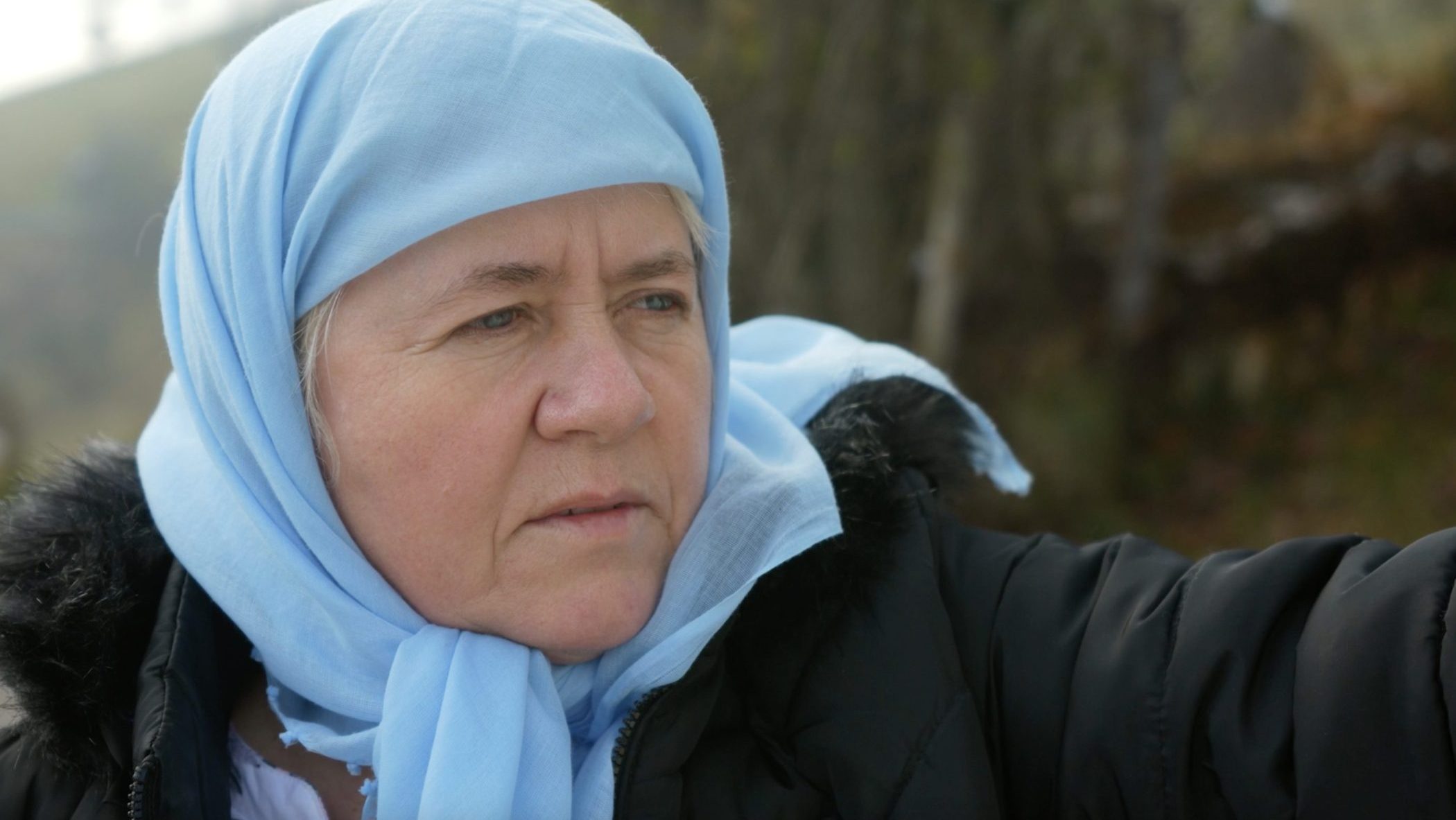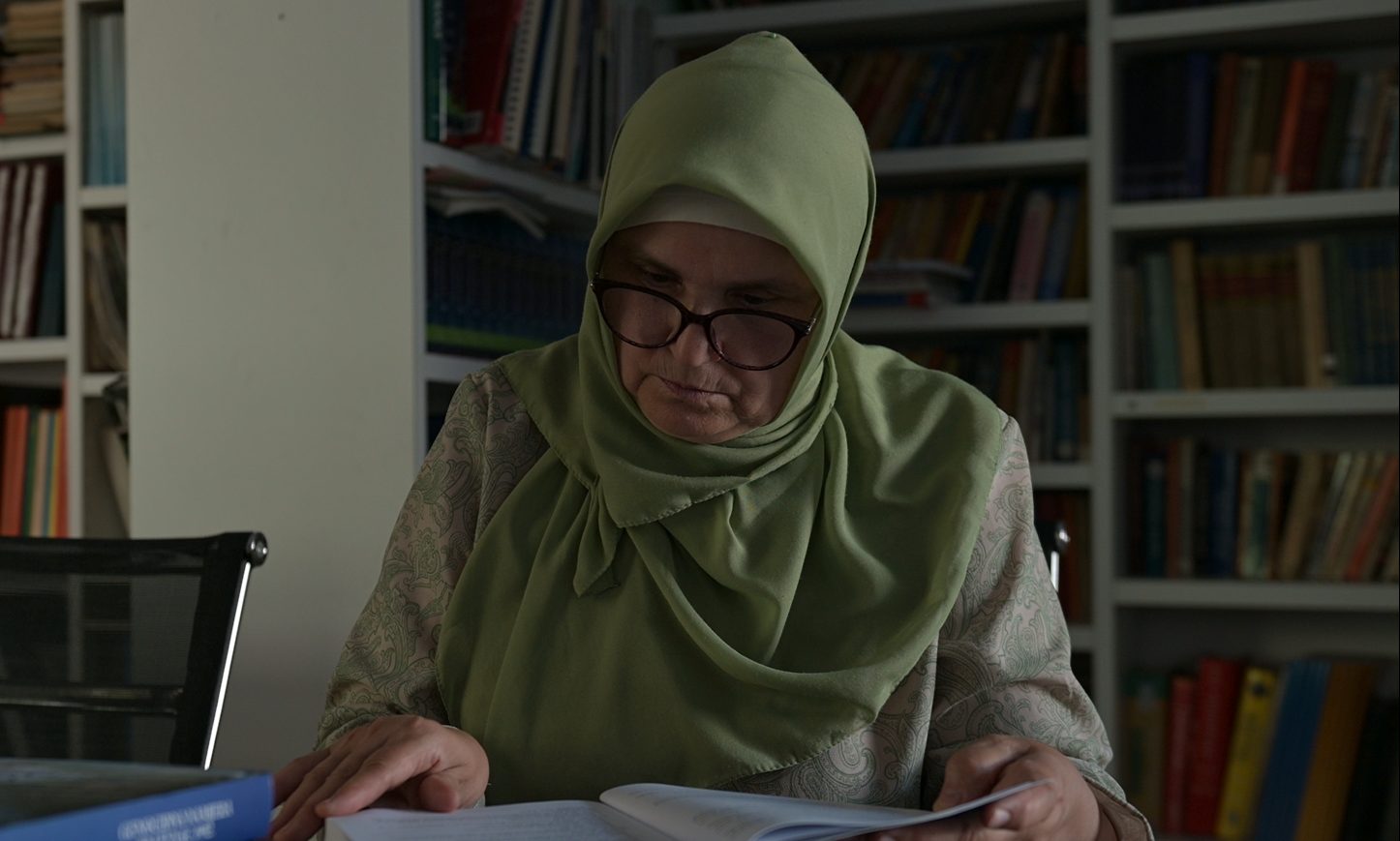This post is also available in: Bosnian
Some of the vehicles Ukrainians wander around between the burned-out vehicles, wanting to see some of the consequences of the Russian attack on Bucha and the surrounding areas in March 2022. In one of the most notorious atrocities of the war so far, Russian soldiers killed several hundred civilians in Bucha.
A man in his forties walks slowly between the vehicles. His attention is not on the burnt vehicles, but on an e-cigarette he keeps constantly close to his lips. A patch on his military uniform has the emblem of the Azov Battalion, which was associated with right-wing organisations before the invasion, and identifies him as Rudolf Roman Ruslanovich.
Ruslanovich is one of about a million soldiers currently fighting on the Ukrainian side in the war against Russia. Like many others, he enlisted in the war himself in order to protect his family. In his case, this mean his wife and a daughter, who live in the city of Irpin, which also suffered at the hands of Russian forces. But what makes Ruslanovich different is the fact that he is an ethnic Russian.
“There is an adage that says: ‘There is nothing worse than a war.’ I’ll underline that three times. It’s true, there is nothing worse than a war. In a war, we lose our fellow humans, parents, relatives. I am unambiguously against the war,” said Ruslanovich.
“I’m serving in the army, and I’ll tell you right away that I like what I’m doing. I made the right decision,” he declared.
While for the international public the war in Ukraine began two years ago, in February 2022, for Ukrainians the conflict with Russia began with the annexation of Crimea in 2014. Ruslanovich has been involved in the conflict since then and has been injured three times.
“As for my mental and psychological state, everything was always normal with me, but since February 24, 2022, I’ve been injured three times already, and I’ve had a mixture of emotions, which have had consequences,” he said.
Today, approaching the second anniversary of full-scale war and after a decade of conflicts marked by crimes committed by the Russian side, people who live in Ukraine are suffering huge consequences for their mental health. As the international public focuses more on the conflict in Gaza, people in Kyiv and the surrounding areas are feeling they’ve been forgotten.
Invasion leaves marks on family life
Two years since the full-scale invasion began, its impact has been immeasurable. Several dozen soldiers are being killed daily on the frontlines in the east, while civilians and troops have fallen victim to Russian drone and artillery attacks.
Many military volunteers were among the victims. One of them was Roman Ratushny, who joined the 2013 Euromaidan protests, the so-called Revolution of Dignity against Russian influence, at the age of 16. Today, in the centre of Kyiv, a street is named after Ratushny, who was killed in 2022.
His mother Svitlana Povalyaeva does not go down that street often, she said with a wistful smile, although some of her relatives live there.
“That’s where I take journalists, or more precisely, where they take me,” she told the Detektor crew at her home.
Ratushny was a social activist. His brother, who was one year older, also went to fight in the war in the winter of 2015, while still a minor. They grew up with revolutions, said their mother, adding that “revolutions happen all the time, every ten years” in Ukraine.
“They were in the Orange Revolution, they were very little at the time, in the Revolution of Dignity on the Maidan , where Roman’s personality was formed,” said Povalyaeva.
“Roman liked Kyiv a lot, he was very attached to it. He and I are rooted in this city to the core. I had a feeling, while Roman was fighting in Kyiv, that he was under the protection of Kyiv in some way. Everything shattered inside of me when I heard that he was going to the east. I had a feeling. I know it’s superstition, but I had a feeling that he was leaving this protection,” she added.
Not far from Kyiv is a settlement called Borodianka. Like Bucha, it has become a synonym for Russia’s targeting of civilians during the invasion. A residential building in Borodianka that was demolished by an artillery shell in 2022 summons up images of wartime Sarajevo.
Oleksandr Gorbachenko survived the attack on Borodianka. Standing with his young son next to the ravaged building, he describes the attack in one word: “Horror.”
“Our central street was totally destroyed. You could smell the stench of burned-out infrastructure. Cars and tyres were burned, and one main road ruined by the tanks that went over it. Borodianka was simply turned black. I was horrified,” he recalled.
After two years, Gorbachenko is getting ready for war. He voluntarily enlisted and underwent military training, and he will soon be deployed to the frontline. “ is more mental fatigue than physical,” he said.
Behind him in the city’s central square are buildings half-destroyed by the attack. Borodianka’s ruins in that city make it look like any place in Bosnia and Herzegovina right after the war. But although everyday life in Borodianka goes on – shops are open, the streets full of people and children are on their way to school – there is no peace here.
Just a few metres away, at a local cultural centre, a group of women are making white winter camouflage for the battlefield, to help their soldiers conceal themselves in the trenches in winter conditions.
“We organise ourselves and we work every day, at least those who can come on working days do. We who are here now come at weekends to make a camouflage net so our guys can hide equipment, we make whatever they need,” said one of them, Olga Piskovets.
Besides her was standing Antonina Stupakova. Her husband has been on the battlefront for 19 months already. They are in touch all the time, but he rarely comes home.
“The hardest part is when the kid asks if Daddy will come home. He is two and he asks all the time. That is the hardest part. He will soon be three. He was a year and one month old when the war began. We don’t tell him that Daddy is on the battlefield, but we tell him he is at work and he will be coming,“ she said.
“We support each other, it’s easier that way. Someone has become tired, someone is staying patient and believes in victory, someone doesn’t,” she said.
Echoes of Sarajevo in Kyiv
 Borodianka women knit camouflage. Photo: BIRN BiH
Borodianka women knit camouflage. Photo: BIRN BiH
According to prosecutors’ offices in Ukraine, more than 100,000 cases of war crimes have been registered so far. International organisations and the Ukrainian authorities fear that the number is much higher, given that not even the United Nations has access to the occupied territories under Russian control.
A large number of organisations, both domestic and international, are documenting crimes. One of them is the Museum of Wartime Childhood, which was modelled on the one in Sarajevo.
Sarajevo’s Museum of Wartime Childhood opened in 2017. Using to a carefully developed methodology, it collects the experiences of people who survived the 1992-95 wartime siege when they were children. In Ukraine, an office was opened in 2018 to collect the testimonies of children from the Luhansk and Donetsk regions in the country’s east who survived the long-running conflict there.
The museum’s methodology was amended because the people who survived the siege of Sarajevo are now adults, while in Ukraine, statements are being taken from children. A lot of care is taken not to additionally traumatise any of them. The first exhibition was held in 2021.
“Our questionnaire is designed in such a way that we ask about day-to-day life, we ask about school, about hobbies, about changes in society, what has changed, where did they have to move to, what was the food like, the heating, the conditions in the basements where children were staying, etc,” said Svitlana Osipchuk, director of the museum’s Ukrainian office.
“Those are the things that a child can talk about, and we do not ask them about extreme experiences,“ she added.
Thousands of crimes have been committed against children and minors during the two-year invasion of Ukraine. For Irina Andreeva, who is involved in psychosocial support in Kyiv, the cruellest crime was the case of a four-year-old girl who was been raped. The Andreev Foundation, which supports survivors of sexual violence, has been working with the child for a while now.
According to Andreeva, much needs to be done in local communities in Ukraine. One problem is that in smaller settlements, people tend to blame the victims of sexual violence.
“Neighbours often accuse women victims of sexual violence, saying that it was their own fault. Such reasoning originates back in the Soviet Union. If a woman was raped, it was her own fault, because she dressed up or dyed her hair that way and so on,“ she said.
“We explain to them that it can happen to anyone, no one is protected from that. We understand that the occupiers use sexual violence as a weapon to scare people. So we have to understand that it’s not those women’s fault, but the fault of the criminals,” she added.
Her organisation works with psychotherapists who have experience of working with victims of sexual violence in Bosnia and Herzegovina. She said the experience of the 1990s Yugoslav wars is very relevant for Ukraine.
Kris Janowski is the United Nations spokesperson in Ukraine, who also worked with peacekeeping forces in Sarajevo during the Bosnian war. Janowski said that one of the main differences he sees between the conflicts in Bosnia and Ukraine is that UN peacekeepers travelled to territories held by all the warring parties in Bosnia, while today in Ukraine they cannot cross over to the Russian side.
However, he said his colleagues are safer in Ukraine, because in Bosnia there was a campaign of attacks on UN staff as well as the everyday shelling of Sarajevo from positions held by the Bosnian Serb Army.
Janowski said that Ukrainians are feeling fatigued as Russian attacks target infrastructure, electricity generation, health institutions and agricultural facilities. The lack of proper school education also represents a special problem for young people, as only half of school-age Ukrainians are able to have in-person classes due to the war.
“The war is now in its 22nd month. We don’t know when the war is going to end. The situation is getting progressively worse,” he said.
“We are now in winter, with people being more exposed to the elements, to various hardships. Communities that are particularly close to the frontline are particularly exposed. Every day people are killed in attacks, and some of the attacks target the civilian population,” he added.
Gaza replaces Ukraine on front pages
 Soldiers in Kiev are far from the trenches. Photo: BIRN BiH
Soldiers in Kiev are far from the trenches. Photo: BIRN BiH
Since autumn 2023, the Israeli-Palestinian conflict has become the focus of worldwide public attention while the war in Ukraine has receded from the headlines. Ukrainians are bitter about the international public tiring of their war, and concerned because they depend on Western support.
One of the organisations that has worked documenting Russian war crimes and advocating for accountability since the annexation of Crimea in 2014 is the Initiative for Civil Liberties of Ukraine. Its director, Oleksandra Matviichuk, was awarded the Nobel Prize for her work on the Tribunal for Putin initiative.
Today, Matviichuk says, Ukraine is attempting to do the impossible. It’s trying to continue a democratic transition that began with the Euromaidan protests and to defend itself against an invasion by more powerful state. She described the lack of attention given to Ukraine on the second anniversary of the invasion as insulting.
“It’s a luxury to feel tired. Probably people in Berlin, in Paris or Geneva can feel tired of the Russian war against Ukraine. They live in peaceful conditions and Russian projectiles do not hit their residential districts. They don’t know how it feels to make tough decisions in shelters and that is probably why they can afford to say they feel tired,” Matviichuk said.
“Frankly speaking, how can you be tired if you’re not involved in the war? People in Ukraine can’t afford to be tired, because if we get tired, we’ll be killed.,” she added.
Volodimir Nesteruk is one of those who don’t have the luxury of being able to feel tired. He is a Ukrainian soldier undergoing treatment after suffering a third-degree head contusion and concussion. Nesteruk said the war is tough.
“ are literally firing everything they’ve got. In such conditions, even those who are mentally the strongest are losing their strength,” he said.
“It’s hard… but we have no other choice but to accept the fact that you have different emotions there, and when going back home, you should love and laugh, but it’s very hard to smile and do the things you normally used to do while thinking about having to go back to the trenches,” he added.
Nesteruk is 34 and has two children – a five-year-old daughter and a son who was born when the invasion started. They live near Kyiv. Nesteruk is worried that he may bring back his feeling from the trenches to his family.
“Tomorrow is my wife’s birthday and my comrade’s funeral. They are completely empathetic, they understand what’s happening and strongly support it, but a lot more depends on you too, if you understand – you have to return to a peaceful place and you must love people there, as there are people who deserve respect and love. I live consciously, I separate emotions so as not to harm the people around me. Just because I have been through a rough patch doesn’t mean that people around me have to go through that too,” he said.
On the front lines in eastern Ukraine, dozens of soldiers are killed each day. The official statistics are not published regularly in order to maintain public morale. Soldiers, their families and the public say it’s a matter of time before there’s a new escalation, which will bring them international public attention again but also cost them more lives.
Rudolf Roman Ruslanovich said he won’t get tired. He explained that he uses his knowledge as a trainer to boost the morale of his comrades.
“I’ll answer you with a quote from our glorious anthem: ‘We’ll give our soul and body for our country.’ I think that is more than enough,” Ruslanovich said.
“I personally am ready to give my soul and body, and I think most people would support me in this.”


